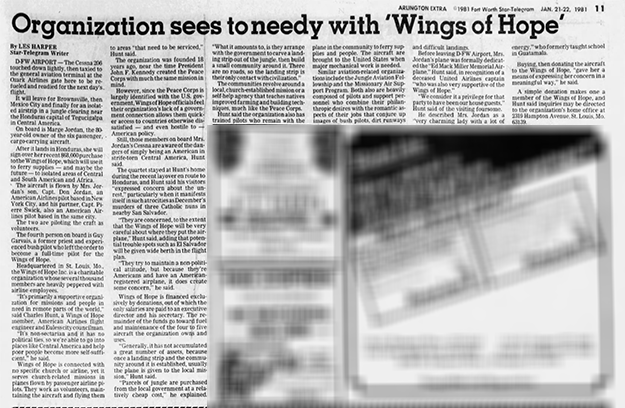Date: January 21, 1981
Location: Fort Worth, TX
By: Les Harper
Newspaper: Fort Worth Star-Telegram
Page: 11
D-FW AIRPORT – The Cessna 206 touched down lightly, then taxied to the general aviation terminal at the Ozark Airlines gate here to be refueled and readied for the next day’s flight.
It will leave for Brownsville, then Mexico City and finally for an isolated airstrip in a jungle clearing near the Honduras capital of Tegucigalpa in Central America.
On board is Marge Jordan, the 80-year-old owner of the six-passenger, cargo-carrying aircraft.
After it lands in Honduras, she will sign over her recent $68,000 purchase to the Wings of Hope, which will use it to ferry supplies – and maybe the future – to isolated areas of Central and South America and Africa.
The aircraft is flown by Mrs. Jordan’s son, Capt. Don Jordan, an American Airlines pilot based in New York City, and his partner, Capt. Pierre Swick, also an American Airlines pilot based in the same city.
The two are piloting the craft as volunteers.
The fourth person on board is Guy Gervais, a former priest and experienced bush pilot who left the order to become a full-time pilot for the Wings of Hope.
Headquartered in St. Louis, Mo., the Wings of Hope Inc. is a charitable organization whose several thousand members are heavily peppered with airline employees.
“It’s primarily a supportive organization for missions and people in need in remote parts of the world,” said Charles Hunt, a Wings of Hope member, American Airlines flight engineer and Euless city councilman.
“It’s non-sectarian and it has no political ties, so we’re able to go on into places like Central America and help poor people become more self-sufficient,” he said.
Wings of Hope is connected with no specific church or airline, yet it serves church-related missions in planes flown by passenger airline pilots. They work as volunteers, maintaining the aircraft and flying them to areas “that need to be serviced,” Hunt said.
The organization was founded 18 years ago, near the time President John F. Kennedy created the Peace Corps with much the same mission in mind.
However, since the Peace Corps is largely identified with the U.S. government, Wings of Hope officials feel their organization’s lack of government connection allows them quicker access to countries otherwise dissatisfied – and even hostile to – American policy.
Still, those members on board Mrs. Jordan’s Cessna are aware of the dangers of simply being an American in strife-torn Central America, Hunt said.
The quartet stayed at Hunt’s home during the recent layover en route to Honduras, and Hunt said his visitors “expressed concern about the unrest,” particularly when it manifests itself in such atrocities as December’s murders of three Catholic nuns in nearby San Salvador.
“They are concerned, to the extent that the Wings of Hope will be very careful about where they put the airplane,” Hunt said, adding that potential trouble spots such as El Slavador will be given wide berth in the flight plan.
“They try to maintain a non-political attitude, but because they’re Americans and have an American-registered airplane, it does create come concern,” he said.
Wings of Hope is financed exclusively by donations, out of which the only salaries are paid to an executive director and his secretary. The remainder of the funds go toward fuel and maintenance of the four to five aircraft the organization owns and uses.
“Generally, it has not accumulated a great number of assets, because once a landing strip and the community around it is established, usually the plane is given to the local mission,” Hunt said.
“Parcels of jungle are purchased from the local government at a relatively cheap cost,” he explained.
“What it amounts to, is they arrange with the government to carve a landing strip out of the jungle, then build a small community around it. There are no roads, so the landing strip is their only contact with civilization.”
The communities revolve around a local, church-established mission or a self-help agency that teaches natives improved farming and building techniques, much like the Peace Corps.
Hunt said the organization also has trained pilots who remain with the plane in the community to ferry supplies and people. The aircraft are brought to the United States when major mechanical work is needed.
Similar aviation-related organizations include the Jungle Aviation Fellowship and the Missionary Air Support Program. Both also are heavily composed of pilots and support personnel who combine their philanthropic desires with the romantic aspects of their jobs that conjure up images of bush pilots, dirt runways and difficult landings.
Before leaving D-FW Airport, Mrs. Jordan’s plane was formally dedicated the “Ed Mack Miller Memorial Airplane,” Hunt said, in recognition of a deceased United Airlines captain “who was also very supportive of the Wings of Hope.”
“We consider it a privilege for that party to have been our house guests,” Hunt said of the visiting foursome.
He described Mrs. Jordan as a “very charming lady with a lot of energy,” who formerly taught school in Guatemala.
Buying, then donating the aircraft to the Wings of Hope, “gave her a means of expressing her concern in a meaningful way,” he said.
A simple donation makes one a member of the Wings of Hope, and Hunt said inquiries may be directed to the organization’s home office at 2319 Hampton Avenue, St. Louis, Mo. 63139.
